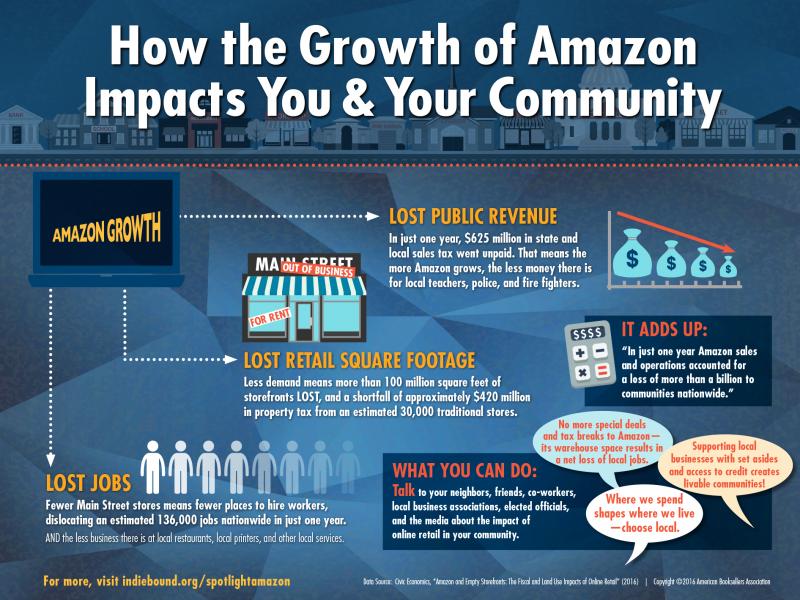- Categories:
New Localism Toolkit a Boon to Booksellers
- By Liz Button
Booksellers are praising the American Booksellers Association’s New Localism Toolkit, which provides materials booksellers can use to educate customers, other indie businesses, and elected officials about the need for public policies that ensure the health of locally owned businesses and their communities.
 The toolkit is part of ABA’s follow-up to the New Localism panel at Winter Institute 11 in Denver and to the release of the Civic Economics study “Amazon & Empty Storefronts: The Fiscal and Land Use Impacts of Online Retail,” which details the overall negative effect Amazon has on Main Street retailers, jobs, and communities across the country.
The toolkit is part of ABA’s follow-up to the New Localism panel at Winter Institute 11 in Denver and to the release of the Civic Economics study “Amazon & Empty Storefronts: The Fiscal and Land Use Impacts of Online Retail,” which details the overall negative effect Amazon has on Main Street retailers, jobs, and communities across the country.
Kevin Gillies, co-owner with his son, Ben, of Denver’s City Stacks Books & Coffee is happy ABA has provided concrete materials and tools that give booksellers more confidence and direction when they approach lawmakers with the findings of the Civic Economics study.
“It’s wonderful to have this data,” Gillies said, “but for most people sitting in our bookshops in our small towns with that data in hand, it is helpful to have resources to use when approaching elected officials. A lot of people aren’t used to doing that sort of thing.”
The New Localism Toolkit includes talking points, fact sheets, and infographics that Gillies plans to use to make inroads with local lawmakers. “I will be going to my local council person. I may even visit the mayor’s office,” he said.
Nina Barrett, co-owner of Bookends & Beginnings in Evanston, Illinois, was also impressed with the Civic Economic presentation on the “Amazon & Empty Storefronts” study at Winter Institute and said she plans to use the items in New Localism Toolkit in her efforts to coordinate an event with the Downtown Evanston merchants’ association aimed at fostering a discussion with local officials and customers.
“I do plan to send the letters [in the toolkit] to elected officials, and I am very proud of belonging to a professional association that’s putting so much thought into getting out ahead of this and helping us take action. I do also plan to use the handouts, or some version of them. We may use them as a jumping-off point and personalize them a little to our situation,” said Barrett.
Barrett, who has been deeply involved in the culinary world for years, said this message of localism has been widely and successfully spread by the sustainable food, farm-to-table movement and has completely changed the face of the food industry. Booksellers, she said, need to work hard to do the same in the book industry.
“I think we need to be equally clever and forceful in disseminating that kind of message to readers who are now making decisions based on price because they don’t necessarily see all the behind-the-scenes components of a healthy publishing ecosystem — or a healthy retail ecosystem,” said Barrett. “We need to make our customers feel proud of the choice they’re making to shop with us, and I think the toolkit does a really effective job of explaining this, and I think the study does a really effective job of grounding the explanation in solid data.”
The New Localism Toolkit, which is also being featured at each of this season’s nine ABA Booksellers Forums, includes:
- FAQs and talking points
- DIY materials for customers
- Materials to share on social media
- Sample letters to elected officials and a sample op-ed
- Links to relevant information and media coverage
The Antitrust Action Kit offers state-specific template letters that booksellers can edit and use to urge lawmakers to investigate Amazon for violating state and federal antitrust laws. —With reporting by Sydney Jarrard

